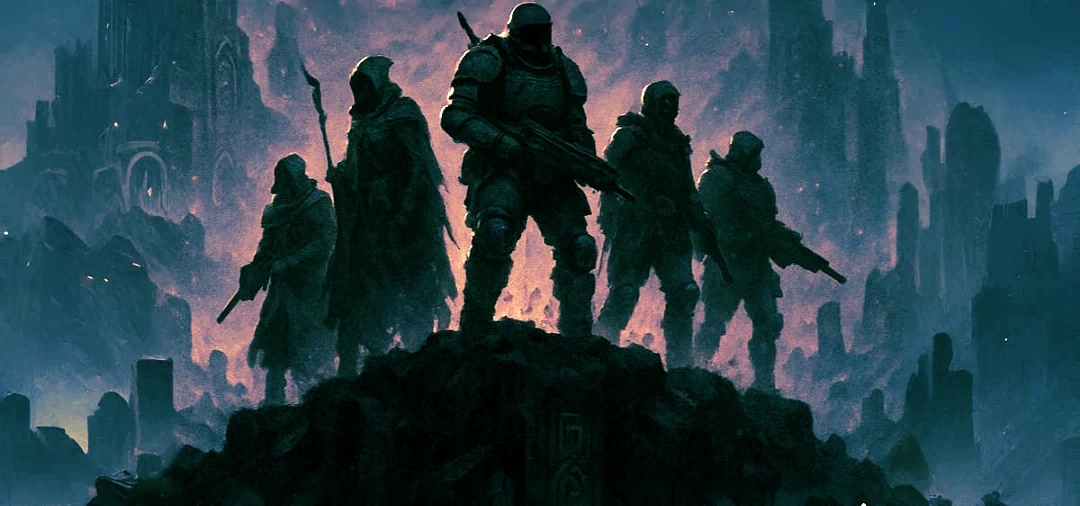From Grids to Paces: Rethinking Movement in Ruinstars
From Grids to Paces: Rethinking Movement in Ruinstars
Ruinstars began as a grid-based wargame. My goal was to avoid the headaches of free-measuring (“You moved an extra half-inch!”), but while the grid solved some problems, it created new ones.
Playtesters often told me the grid was a blocker, preferring freeform measurement instead.
Today I’m exploring the available options to address this and try to figure out a way to make everyone happy.
Pros and Cons
Grid
Pros
- Fast movement
- Fast range and line of sight determination
- Easier setup of games, objectives, markers, etc.
- The rules, missions, and unit abilities were all written assuming a gridded battlefield
Cons
- Less freedom of movement
- Higher barrier to entry for new players, especially experienced wargamers who already have battle mats, terrain, and tape measures
- I tried to offset this with print-at-home tiles, but in 2025 fewer people have access to a printer, and it’s still an extra step just to be able to try the game
- Does not easily support minis that are larger than the Square’s dimension. How do I fit my hero who is on a 50mm base on a Square that is 40mm wide?
Freeform
Pros
- Much more freedom of movement and strategy
- Familiar territory for experienced wargamers
- Reuse your current battle mats and terrain, much more choice in terrain options
Cons
- More difficult for newcomers to understand line of sight, movement, and range.
- Slows down play in some cases with arguments about who can move where and who’s in range or not.
- For Ruinstars, freeform means reworking every rule and mission to match, so it’s a big shift, not a quick patch.
Potential Solutions
Other Games’ Approaches
- Gaslands shows how simple cardboard gauges can satisfy both precision and speed.
- Killteam first tried distance symbols (triangle = 1 inch??) which confused players; later editions returned to inches for clarity.
- Deadzone proves grids can be clever and fun, but it’s built as a physical box product, while Ruinstars is designed for DIY accessibility.
Dual Mode
I don’t want a player’s preferred way to play to feel “tacked-on” or secondary.
In a “dual” mode, the rules, abilities, and missions support both gridded and freeform setups. This can be difficult to maintain (essentially two sets of rules, abilities, and missions).
Splitting rules this way often makes both modes weaker, and I’d rather keep Ruinstars sharp and consistent.
Chosen Solution
Introducing Paces
The rules, abilities, and missions were all rewritten to use Paces. A Pace is the game’s unit of measurement, roughly equivalent to our Squares.
1 Pace = 40mm (about 1.5”). On a grid, each Square is 1 Pace wide.
This approach has the advantage of allowing players to play how they want:
On a regular battle mat, just measure as you would in any other game, and with optional print-at-home gauges we can facilitate movement and measurements.
This rewrite was a big undertaking. Every mission and ability needed adjustments, but it future-proofs the game for both play styles.
I personally much prefer the grid. It’s the game mechanism that has most helped our playtest group to play games quickly with minimum fuss, but I completely understand other players’ preferences, and I really want other players to try out the game!
This shift means Ruinstars can welcome more players, while still letting grid fans (like me) keep their favorite way to play. As always, I’m open to any feedback and I’m excited to hear what you think - Will Paces make the game easier to bring to your table?
Files
Get Ruinstars
Ruinstars
Free, fast-paced, miniatures-agnostic sci-fi skirmish wargame.
| Status | Released |
| Category | Physical game |
| Author | ruinstars |
| Genre | Action |
| Tags | Indie, Sci-fi, skirmish, Tabletop role-playing game, wargame |
More posts
- Endure the Endless: Introducing Horde Mode21 hours ago
- Factions, Missions, Campaign Updates12 days ago
- Scripted Operations are Live!85 days ago
- Telling a Story: Scripted Operations89 days ago
- Big news and updates!92 days ago
- Factions, Tokens, BattlefieldsJun 28, 2025
- Launched!Jun 02, 2025

Leave a comment
Log in with itch.io to leave a comment.